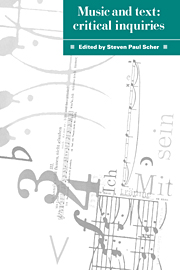Book contents
- Frontmatter
- Contents
- List of figures
- List of contributors
- Preface
- Acknowledgments
- Part I Institutional dimensions and the contexts of listening
- Part II Literary models for musical understanding: music, lyric, narrative, and metaphor
- Part III Representation, analysis, and semiotics
- Part IV Gender and convention
- Index
Preface
Published online by Cambridge University Press: 04 September 2009
- Frontmatter
- Contents
- List of figures
- List of contributors
- Preface
- Acknowledgments
- Part I Institutional dimensions and the contexts of listening
- Part II Literary models for musical understanding: music, lyric, narrative, and metaphor
- Part III Representation, analysis, and semiotics
- Part IV Gender and convention
- Index
Summary
In recent decades, interdisciplinarity has had a profound impact upon humanistic studies and has occasioned exciting and innovative critical developments. As a result, more and more scholars and critics today are willing to probe the validity of traditional disciplinary premises, to reconceive the scope, aims, and interpretive trends of their own disciplines in relation to other fields, and to cross disciplinary boundaries while pursuing discrete research interests.
Methods that have emerged in literary criticism and theory since World War II have been particularly influential in charting the course of interdisciplinary inquiry. Since the early sixties, when New Criticism had lost its persuasiveness, there has been an unprecedented proliferation of theoretical approaches. Poststructuralism, hermeneutics, semiotics, reception aesthetics, and deconstruction, as well as Marxist, feminist, psychoanalytic, and reader-response criticism, and more recently New Historicism, are prominent examples. Diverse and disparate as these theories may be, their practitioners are generally willing to transcend disciplinary confines and apply insights and perspectives of other disciplines and media. Indeed, “the whole of what the French call the human sciences is being more or less rapidly transformed into something called theory, which encompasses not only literary criticism but also philosophy, history, art history, musicology, architecture, psychology, and social and political theory as well.” The notion of interdisciplinarity thus appears to be ubiquitous and compelling.
But while ample scholarly attention has been devoted to the interrelations of literature and the visual arts, not nearly as much effort has been expended on the reciprocal illumination of literature and music.
- Type
- Chapter
- Information
- Music and TextCritical Inquiries, pp. xiii - xviPublisher: Cambridge University PressPrint publication year: 1992



